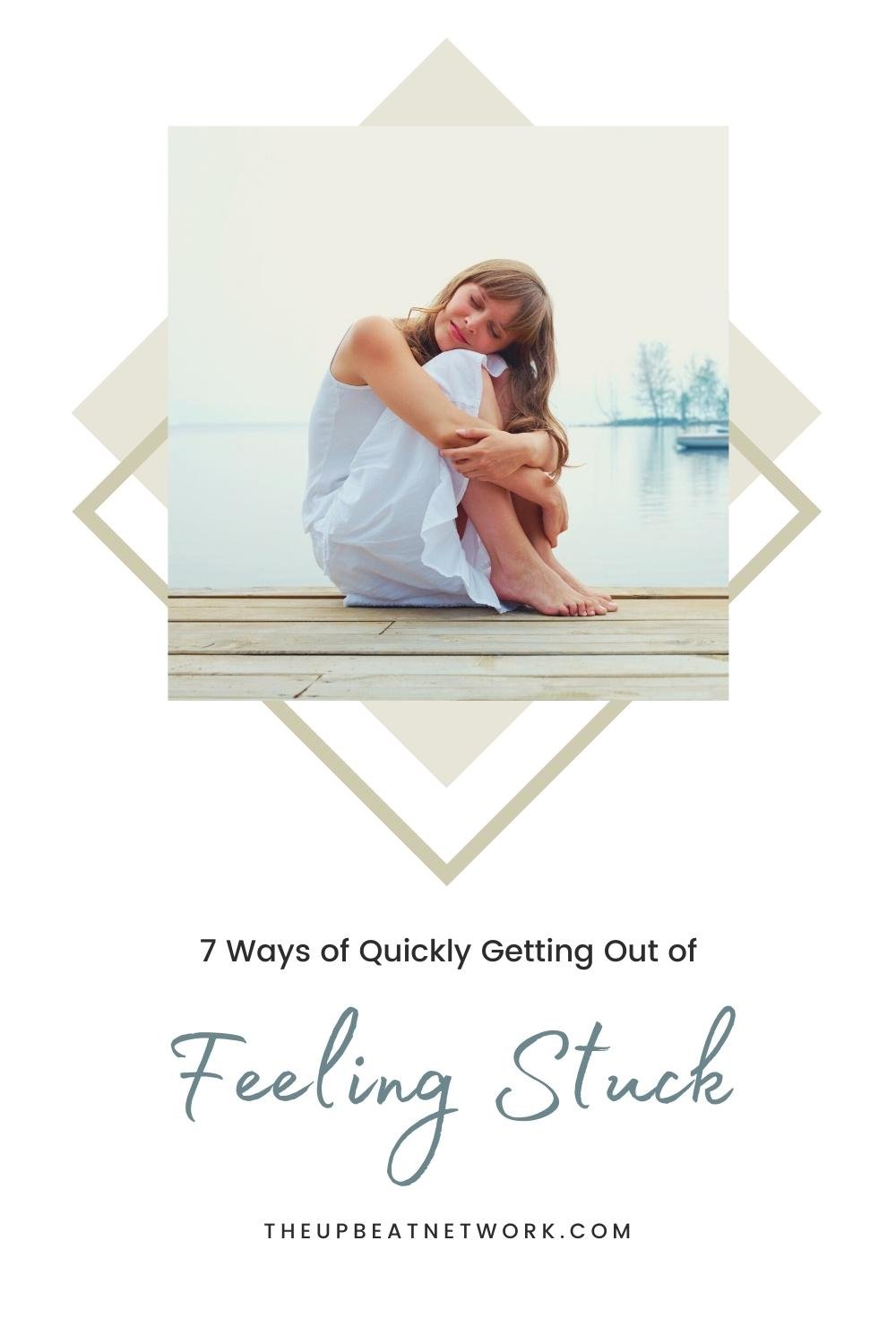Before I reached a point of balance and overcame my depression, the feeling that was all too familiar, yet I dreaded every day, was feeling stuck.
If you’ve never experienced it, I congratulate you. But if you belong to the estimated 21% of the population (at least in the UK) who are currently battling symptoms of depression, especially as the pandemic is still not over yet and things are so far from the old ‘normal’, more likely than not you know the feeling.

I consider myself lucky to have overcome depression and the majority of other health ailments that I had. I cherish my life in ways I never thought possible. And that feeling of ‘stuckness’? It occasionally rears up its ugly head, but I now know exactly what to do to regain my balance quickly, without overloading my system or giving in to unhealthy cravings that don’t serve me.
Without further ado, here are my top seven tips on how to stop feeling stuck and take control over your mental wellbeing:

1. Practice kundalini yoga
Kundalini yoga is a form of yoga that involves chanting, singing, breathing exercises, and repetitive poses. Its purpose is to activate your Kundalini energy, or shakti. This is a spiritual energy that’s said to be located at the base of your spine. While to many people this may seem awfully woo-woo, there has been research to suggest that chanting in particular may help activate deep parts of our brain, such as the pineal gland (believed to be the seat of our soul, our Third Eye) and physically responsible for the secretion of the hormone melatonin.
One of my favourite kriyas, or complete exercise sets, is Kirtan Kriya. Kirtan Kriya takes roughly 12-14 minutes to practice and comes with a myriad of scientifically proven benefits, e.g. in this paper:
- Improvements in memory in studies of people with subjective cognitive decline, mild cognitive impairment, and highly stressed caregivers
- Better sleep
- Decreased depression
- Reduced anxiety
- Down-regulation of inflammatory genes and up-regulation of immune system genes
- Improvement in insulin and glucose regulatory genes
- Increased telomerase by 43%, “the largest ever recorded”. (Telomerase is responsible for the maintenance of telomeres; in people who age or decline quickly, telomeres have been found to shorten quickly too).
- Improvements in psycho-spiritual well-being or spiritual fitness, important for maintenance of cognitive function and prevention of Alzheimer’s Disease
To perform Kirtan Kriya:
- Sit comfortably on the floor (on a cushion if required) or in a chair that allows you to stretch your arms slightly to the sides. Make sure your spine is straight – imagine that there is a rod going through your back. Drop your chin slightly to lengthen the back of your neck. Drop your shoulders so that the shoulder blades are closer together.
- First “tune in” by chanting the Adi Mantra three times: Ong Namo Guru Dev Namo, see a demonstration:
- Then perform the kriya for 11-12 minutes:
- Keeping your elbows straight, chant the mantra: Saa Taa Naa Maa.
- On Saa, touch your thumb and index finger
- On Taa, touch your thumb and middle finger
- On Naa, touch your thumb and ring finger
- On Maa, touch your thumb and little finger.
- For the first 2 minutes, chant it using your normal voice or louder
- Then chant it for 2 minutes using a “strong whisper”
- Then for 4 minutes chant it in your mind only, silently
- Then come back to a whisper for 2 minutes
- Finally chant it using your normal voice or louder.
- More info here and music with a demonstration:
- Finally “tune out” by chanting long Sat Nam: Sat should be approx. 7 times the length of the short Nam.
If you practice this kriya, you may find that it becomes the most significant moment in your day, involving a shift in your energy, your perspective and your engagement with your world.
Doing any type of kundalini yoga has been a crucial element of my self-healing: it gifts me time for me, for my energy, for my wellbeing. Do not underestimate its power!

2. Time in nature
Going out on a walk, even just a short one, comes with a myriad of benefits. Combine it with mindfulness for an extra boost: just be present in the moment, aware of what is happening around you and within you without any judgment, guilt or anger. If you walk faster, your heart rate will go up and your brain will kick-start the production of hormones associated with happiness. Fresh air will also oxygenate your blood and your metabolism will be boosted.
While this may not directly deal with whatever is happening in your life that is making you feel stuck, it will help snap you out of the mindset and elevate your energy. It will also get things moving in your organism mentally and physically.

3. Journal
Journalling is a powerful way of dealing with whatever is on our minds. One of the simplest ways of doing it that I practice whenever I feel overwhelmed and out of control is writing a variation of ‘morning pages’: at least three pages of a ‘mind dump’, where I write down anything that comes to my mind, whether it is about what I’m having for tea, a throw-away comment that I got myself ‘stuck’ on, or anything else.
It is helpful to ask yourself questions as if you were your own best friend, and try to answer them on paper. For example, where do you feel out of control? What need do you have that isn’t being fulfilled right now? What is in your control that you can change?
Another angle that you could take is: what would need to happen for you not to feel stuck? What would your life look like? What can you do now to go in the right direction?
Try not to berate yourself – after all, you need your best friend here (that is yourself!). Approach the task and yourself with compassion and gentleness. You are always trying your best and that is nothing to be ashamed of or cross about.
I often find that in my ‘brain dump’ journalling sessions I write about things I didn’t even know I was thinking about days, weeks, sometimes even years later, and the level of detail that I go into often surprises me.
By the end of your writing session a few things are likely to happen:
- You will feel lighter, less overwhelmed and more engaged with your own life
- You will have transferred some of your emotions onto paper and they will no longer sit at the forefront of your mind
- You will have gone more in depth into what is bothering you in your current situation and at least started unravelling it.

4. Talk to someone
I don’t think that this is said often enough: when you feel stuck, anxious, depressed, one of the best things you can do is reach out to someone you trust for help. It can be your mum, your sibling, a friend or colleague; or it could be someone who specialises in helping people, e.g. a charity such as Mind or the Samaritans, your GP, a church leader (if you are religious) or a therapist. Many companies, especially large ones, also offer mental health support to their employees.
I understand that asking for help doesn’t come easily to many people, as I’ve been there and had to do just that. I won’t lie to you, I didn’t like it much, especially as I had a bad experience with therapy in the past and not all of the significant people around me knew how to handle the situation.
It took me time to accept that if I ask for help, I can open up and trust someone else to help me. But when I did that and got referred to a therapist, her compassion, understanding and lack of judgment made it so much easier for me. I managed to learn useful CBT (Cognitive Behavioural Therapy) techniques and, combined with my other holistic approaches, I made an astounding recovery I never thought possible.
It does not diminish you to ask for help.
It does not mean that you are weak, either.
It is human to ask for help, and you don’t need judgment from anyone, including yourself. All you need is empathy and a willing ear that will hear you out. And perhaps a good old hug – that really helps too.

5. Celebrate your blessings and achievements
If you’ve been following me on social media, you will know that I am a great fan of keeping a gratitude diary, and for me gratitude has proved to be of great help for my mental health.
Gratitude has been scientifically proven to improve the perceived quality of your life, regardless of your personal situation, and taking time to count your blessings has a huge impact on how you feel about yourself and about others.
To start a gratitude diary, simply download an app (I use this one) or get yourself a pen and some paper. Then write a few things that you are grateful for today and spend a moment really appreciating them. At first it might feel forced and unnatural, and you might struggle to come up with three things (or people, or events) that you’re grateful for, but with time, this will change. I usually log five entries in my diary each night and on the vast majority of nights, I look forward to my gratitude practice, as it reconnects me with the day’s events in a positive way.
To your gratitude list, you can add just one more entry that will boost your practice even more: say what you are proud of today. It doesn’t have to be anything huge, just meaningful to you. ‘Today I am proud of not losing my temper with the kids when they were arguing’ or ‘Today I am proud of the amazing meal that I cooked, it was delicious’, or ‘Today I am proud of having taken good care of myself by going on a little walk’. It’s that simple, and yet the impact is palpable.
This will help you feel good about what you do on a daily basis, again helping you count your blessings and helping you see the good that is already present in your life right now.

6. Emotional justice
One abstract concept that has really aided me in my healing has been emotional justice. Perhaps it appeals to the philosopher in me, but the idea that my emotions are just as valid as the external world was hugely helpful in reassuring me that I am OK, I am enough as I am, and that my emotions are here to tell me something.
If we approach our mental health from a point of love, compassion and acceptance, we realise that emotions are part of our life and want to be heard out. This does not mean that when we feel angry, we need to start destroying everything around us; but it does mean that something happened to make us angry (whether within us, as inflammation, or externally, because someone has done something that angered us).
I treat emotions as information and an invitation to go deeper. Why am I feeling this way? What has happened? What does my intuition tell me should happen next? How can I support myself best? How can I see whatever has caused me to feel this way with compassion and understanding?
All too often we are told to hide our emotions – this is particularly true of women who are often mocked for their emotions, their tears, loudness, PMT- or menopause-induced behaviours. But if we give our emotions credit for providing us with information, bridging communication between our thinking minds, our physical bodies and the external world, we are enabled to work with ourselves, in line with ourselves rather than against ourselves.
Creating space for what you feel has been a powerful tool for me; acknowledging that my feelings are here, and they are here for a reason was a great step in the direction of true mental wellbeing.

7. Look after your body
Last but not least, when feeling stuck (or numb, or depressed), I highly recommend that you look at what you are putting into your body and how you are treating it – if you can manage it, without judgment and simply by focusing on the facts. This is not about going on a guilt trip. This is about looking at what is happening and where you can adjust your life to make your life not only bearable but actually enjoyable and fulfilling.
You might not feel much like it, given the state of things (whatever that is for you), but there is a very real possibility that how you feel is related to:
- Your diet and hydration
- Your sleep patterns
- How often you exercise
- How you cope with your perceived stress levels
A lot of the food we put in our mouths really doesn’t serve us and causes inflammation (e.g. sugar, some types of dairy, lack of nutrients or the wrong balance of nutrients). If we don’t drink enough water, this causes inflammation. If you drink too much caffeine or don’t consume enough zinc, your cortisol levels go haywire, you feel stressed and, you guessed it, this causes inflammation.
Having healthy routines has been hugely important in my own recovery.
Once a week I take 15 minutes to plan my menu for the week. This way I avoid getting a last-minute takeaway because I can’t think of what to cook tonight – when it’s planned ahead of the time, I don’t need to think about it again. (It also helps me with my weekly shopping, saving me money.)
Also once a week I train with my amazing training buddy, and I try to squeeze in another workout or three beyond that. I highly recommend training with someone else, ideally someone whose fitness level is similar to yours. If you don’t know anyone, try your local neighbourhood forum, your GP practice (they often have ‘practice champions’ who organise walks and exercise in groups), or have a look at your local Meetups.
I rarely go to bed past 10pm and I tend to get up around 6-7am. Having a regular sleep routine has stopped my seemingly never-ending cycle of going to bed late, feeling groggy half a day, trying to get more done, so going to bed late… It was a vicious circle that went on for years. I now know not to stay up beyond 10pm, otherwise I’ll be all grumpy again. Cortisol levels go up after 2am, so you get your best sleep between 10pm and 2am when they are at their lowest. If you struggle with your sleep routine, it might help to set an alarm at e.g. 9.30pm to signal the time when you need to start getting ready for bed.
When it comes to coping with stress, practicing kundalini, gratitude, exercise all helps. You could also try meditating, mindfulness, simple breathing exercises such as box breathing. With time you will gain more resilience.
From my personal experience, all these little things add up to a huge difference in how I feel and how quickly I recover from the rare days when my mental health is worse. Knowing and accepting that not every day will be wonderful and joyful from start to finish also helps: I just go with the flow and look out for the beautiful moments that are scattered here and there, even on rainy days.
I hope that you give these quick ideas a go and see a positive difference in how you feel from day to day.

About Anna Lycett, Metabolic Health Coach
Anna Lycett is a certified gym instructor and a professional health & nutrition coach dedicated to helping people recover their health. She believes in a holistic approach grounded in science and practical experience, working on nutrition, lifestyle habits and understanding ourselves better. Her work helps her clients achieve their goals, gain self-confidence and feel empowered to take control of their health.


Comments 2
Hi Anna,
I’ve tried to subscribe to the Rays of Light newsletter, but everything I’ve tried on this website isn’t letting me do it. Please can you add me to your mailing list. There is a lot of good information here, I’m interested in more.
Thank you,
Lynne Kane
( from the Pickering pre-diabetes course)
Author
Hi Lynne, oops, I’ll need to look into why that’s the case – sorry about that! I’ve added you now and you should receive your first newsletter very shortly.
Keep in touch,
Anna